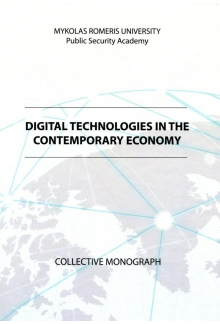- Titulinis
- Dalykinė ir mokslinė literatūra
- Ekonomika, finansai, vadyba
- Kitos ekonomikos ir finansų knygos
- Digital Technologies in the Contemporary Economy
Digital Technologies in the Contemporary Economy
Leidimo metai: 2022
Leidinio kalba: Anglų
Formatas: Kieti viršeliai
This collective monograph has been prepared based on the results of scientific research conducted in 2020-2022. These studies were carried out as part of the scientific activities of the Public Security Academy of MRU. Members of the collective monograph participate in the activities of the MRU Laboratory of Harmonious Innovations. The results of these studies show that digital technologies are a priority not only locally, but also internationally.
Digital technologies are taking over the world, and advantage is secured by the ability to quickly master them. There is no doubt that digital transformation will have a significant impact on almost any industry, including agriculture. This monograph was prepared in English, but a large, international team of authors participated in its preparation. The monograph consists of seven chapters, analyzing digitalization management solutions, innovative marketing, digital transformations, and digitalization as a factor of economic security in the face of global challenges. It also touches on and analyzes the issues of digitalization and society, along with the digitalization tools that are used in the public sector.
The purpose of this monograph is to reveal the use of digital technologies in the modem economy.
To achieve this goal, the following tasks were set:
1. Analyze the modernization of management processes in the digital economy (Natalia Mihai, Kateryna Polupanova, Daiva Bickauske, Zaneta Simanaviciene, Arturas Simanavicius, Saulius Kromalcas);
2. Identify digital transformations in the financial and banking sectors of the economy (Alfiya Dadakhanovna Akhrorova Fuzail Jumaboevich Boboev, Aleksey Mints, Pavlo Sidelov, Oleksandr Kalinin, Gulnora Yusupova, Mukhbira Kornilova);
3. Analyze innovative marketing technologies in the digital economy (Ganna lefimova, Oleksiy Pashchenko);
4. Describe digital entrepreneurship (Daler Garibmamadov, Nargis Mukimova, Nisso Berdieva, Galyna Shvets, Snieguole Matuliene, Egle Stareike, Olena Khadzhynova, Pavlo Burak, Oleksandras Kalininas, Firuz Kodirov);
5. Reveal the theoretical foundations of the analytical support of digital transformations (Nataliia Havrylenko, Liliya Filipishyna, Kristina Filipishyna, Irina Korostova, Daiva Bickauske, Zaneta Simanaviciene, Audrone Zemecke, Aurelija Puraite);
6. Uncover digitalization as a factor of economic security and a global challenge (Karyna Borblik, Viktoriya Gonchar);
7. Show the role of society in the digitalization process (Larysa Hryshyna, Tetiana Gorokhova).
The sections of the monograph are formed in accordance with the tasks set. For the disclosure of each task, a scientific analysis of the literature is carried out and specific episodes of analysis are provided. Each issue is accompanied by a bibliography. The authors present the concepts of the phenomena under consideration and analyze them. The main research methods are the analysis of scientific literature sources, synthesis, induction, deduction, abstraction, analogy, and modeling. When conducting empirical studies, the organizational elements of a sociological study were used, questionnaire methods were employed, and the analysis of the results obtained was carried out using qualitative analysis and statistical methods. In the monograph, the authors review many classic works, present a detailed analysis of the problem, and reveal the essence of the digitalization of economic processes.

